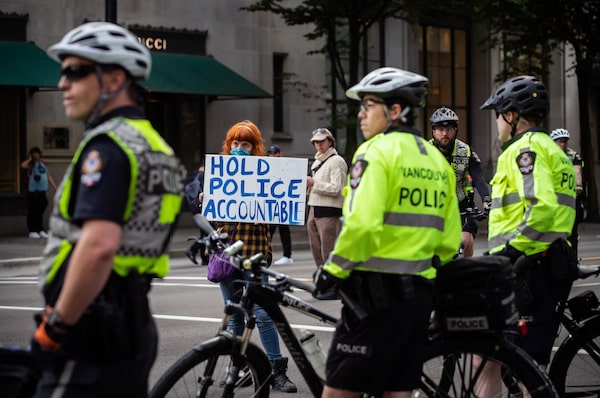
In March, the Vancouver Police Board successfully appealed a City of Vancouver decision that cut millions from the police budget.DARRYL DYCK/The Canadian Press
Esquimalt Mayor Barb Desjardins is bracing for what could be yet another divisive skirmish over more money for police, one she knows could end with her township being ordered by the province to come up with another $270,000 in taxpayer money.
Her council just voted against paying its prescribed portion of the costs for six more police officers and four staff for shared Victoria-Esquimalt policing on top of the $8.4-million it contributed last year.
If a standoff continues, it’s likely that the provincial director of police services will do a review and order the city to pay. That’s what happened to Esquimalt with its 2018 budget, to Nelson in 2015, to Victoria in 2020, and, in March, to Vancouver after it tried to hold back $5.7-million from the $340-million police budget for 2021.
The mayor is worried about sticking her residents with additional taxes if the province rules, once again, that Esquimalt has to pay. She says her municipality has been stuck with an unfair share for years as part of the 2002 Victoria-Esquimalt policing agreement.
The recent police-budget battles in Esquimalt and Vancouver are highlighting what many civic politicians say is a flawed system for governing interactions between police and the cities they work in. They are hoping that the province’s police-act review, set to be released this spring, will bring change to what is a no-win situation for the 13 communities in the province that have municipal police forces and a police board.
“I’m waiting to see what the police-act review comes up with,” said Vancouver Councillor Christine Boyle, who was dismayed by the review that ordered the city to give police the $5.7-million in additional money that the board asked for in 2021.
She said at the very least, councils need to be able to get much more information about the costly police budgets they’re supposed to approve. “Council gets only a very high-level version of the budget and asking questions seems to be interpreted as a criticism. But we don’t get details on items like the cost of communications and recruitment videos.”
She and others have expressed frustration at how little power city councils seem to have. In response, the assistant deputy minister in charge of the police reviews, Wayne Rideout, wrote a letter to Vancouver Mayor Kennedy Stewart last week to counter that opinion.
“I appreciate that the governance framework for municipal police departments can be a source of frustration for municipalities,” he wrote. But “these limitations do not mean a municipal council’s public-safety concerns can or should be ignored by the police department or board; in fact, I would suggest that boards and police departments do this at their peril.”
In the meantime, cities are trying to find solutions to all kinds of big social and environmental problems – climate change, homelessness, mental health, addiction, housing – but have limited resources and powers. Cities are regulated completely by their provinces but they also must deal with provincial downloading that creates new sets of difficulties.
Nelson Mayor John Dooley says his city has struggled as the province took over ambulance services and then reduced them, meaning that the city-financed police and fire services have to do more than ever. The same situation prevails when it comes to other serious issues.
“Our caseload is higher because there’s gaps in mental health, addiction, people released from prison with no supports, no drug treatment. And police and fire are the first people on the scene for that.”
So cities watch police calls go up and struggle with how to pay for enough service to cover that. If a city tries a different approach, it risks being ordered to pay for police anyway.
Former Nelson mayor Deb Kozak, whose council voted against hiring two more officers in 2015, said she lobbied to have more options than simply hiring officers.
“We looked at what we could do to support police more and we tried to create more supports for people on the street.” She and other councillors thought it might be more cost-effective and helpful to hire some outreach workers to deal with some of Nelson’s growing social issues.
But the city was still ordered later to hire the two officers anyway, at a cost of more than $200,000. “For a town of 10,000, that’s huge,” said Ms. Kozak, who was replaced by Mr. Dooley in the 2018 election.
Victoria Mayor Lisa Helps, whose council voted against hiring two new officers for a specialized mental-health team in 2020 and then was ordered through a provincial review to hire at least one, said that kind of “Ping-Pong” regulation of city policing is frustrating.
“Who is left in the middle are hard-working Victoria police officers and the public.”
In Vancouver, Ms. Boyle and some others expressed concern that police and their boards are able to dictate whatever they want in terms of a budget and the city is left just writing cheques.
But several other municipal politicians said it doesn’t work quite like that. The mayors of Surrey, Victoria, Esquimalt and Nelson, along with police representatives, all said there are long discussions held between city staff and police boards or senior police officers to go over budgets. That’s where trade-offs and agreements on reductions happen.
“This notion that this is some kind of issue where council has no say is not true,” said Tom Stamatakis, the former head of the Vancouver police union from 1998 to 2019, now president of the Canadian Police Association.
He said the decision by some councillors to ask for a freeze that amounted to $5.7-million less than the Vancouver board had requested came as a surprise and appeared to be politically motivated.
“It was so arbitrary. There was no reason given. Making the decision without any reason, that was alarming,” he said.
The police board did not anticipate the freeze, which police later said prevented them from hiring 60 new officers. It had prepared three scenarios and presented the lowest number of the three to council for approval.
But Ms. Boyle said it was far from political and the police had had plenty of notice that council was looking for ways to trim the 2021 budget, after police declined to accept any suggestion of a cut to their 2020 budget. All other city department rolled back expenses and, in some cases, salaries, when the city moved to cut costs as revenue plunged at the beginning of the pandemic.
We have a weekly Western Canada newsletter written by our B.C. and Alberta bureau chiefs, providing a comprehensive package of the news you need to know about the region and its place in the issues facing Canada. Sign up today.
 Frances Bula
Frances Bula